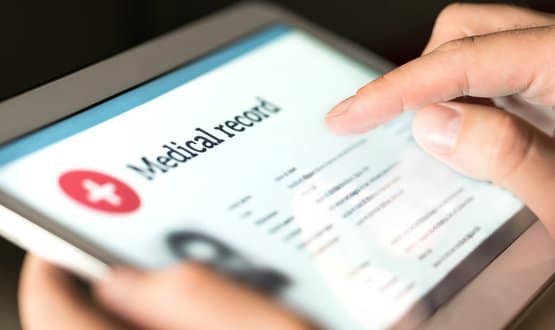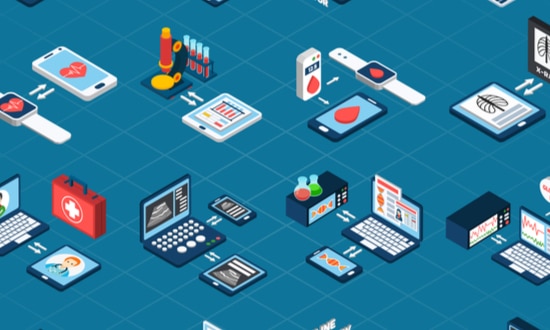The challenges posed by personal health records
- 1 November 2022

In his next piece for Digital Health, Kevin Hamer – a freelance digital consultant who has worked with personal health records (PHRs) for the last ten years -, looks at key questions we need to ask to move forward when it comes to PHRs and scaling co-production platforms.
The growing appetite for PHR platforms leaves me, having recently left the NHS, reflecting on where we are with them and the challenges ahead that must be faced if we are to make a success of co-production initiatives.
A coherent experience
The first is how we present a coherent experience for our patients. There are seemingly endless health apps in the smartphone app stores but the number of health apps designed to be integrated with clinical systems is also increasing. There are new market entrants but also other providers with business models not previously built around patient interactions now pivoting their solutions because they see the potential of co-production.
I have spoken to a number of hospitals that find themselves with more than one patient facing solution, sometimes several – an app/solution for patient reported outcome measures (PROMs), another for virtual wards, another for patient initiated follow-up (PIFU), electronic delivery, reminders. And on it goes. Now, put yourself in the shoes of the patient. It isn’t hard to imagine the potential confusion that could arise and in the worst scenarios these could potentially impact patient safety. A modular and integrated approach is absolutely fine but it has to be seamless for the patient. There needs to be a single point of access, NHS login authentication and co-ordination around functionality such as surveys and notifications.
Poor data quality
A further concern is how ‘fit for patient consumption’ the data in our existing clinical systems are. These systems have never been architected with consideration of a need to serve this information digitally to the patient. This creates a number of problems when trying to implement even the most obvious of use cases such as sharing appointments, documents and results with the patient. I have seen challenges relating to the quality, timeliness and updating of information that is then difficult to present in a coherent way to the patient.
The consideration of what is needed for the patient is critical not just for PHR platforms but also the systems that supply data to the PHR. The incoming Integrated Care Systems (ICS) have resulted in fresh thinking to ensure that clinical systems and data flows can appropriately support care across multiple providers. I would argue that conversations such as ‘what might an EPR look like for this ICS’ must also consider how the data will be delivered to the patient and the merits of each possible solution in this regard.
In addition to the various data quality issues of central clinical systems, there is use of ‘grey’ systems – local systems that not known about (or controlled by) central IT teams. These systems contain PHR-relevant information exists that the patient will never see and the PHR will be incomplete. This brings us on to the point of education. All staff need to understand and be aware of the direction of travel with regard to increasing patient access and co-production. PAS and scheduling systems can be subject to localised practice and misuse that either prevents automated upload of data to the PHR or demands a number of workarounds or just a sub-optimal experience for the patient.
What co-production means
There is also a necessary question of what we consider a ‘personal health record’ to be. Is the PHR an extension of the clinical record or a completely independent record? The answer (or interpretation) is critical in relation to information governance, consent and GDPR. If we’re using the PHR as a vehicle for co-production then the existing IG rules – e.g. one data controller – are clearly problematic since the provider should not be held responsible for something the patient has added/amended in the record. And if the patient isn’t adding useful things to the record, then it is a stretch to call it co-production at all.
My experience is that suppliers and service providers need help in this space since much time is burned in conversations concerning these subjects without definitive answers. Some choose risk aversion and don’t implement solutions because of the burden/concern of risk management. There is a need for education but also support since not enough people know if they are on the right side of the law. We have, for example, been quick to bring in clinical safety legislation but there is a lack of qualified clinical safety officers in the NHS.
Who owns the record?
The personal health record presents a fantastic opportunity to put a wide range of digital information in front of the patient but is the record truly patient owned? I think people rightly believe that, on at least a theoretical level, the record belongs to the patient. We have come to accept that the data has always belonged to the patient and, where the data is stored on clinical systems, NHS providers have simply been the guardians of this data. The key change with PHRs is the ability to put this information in the hands of the patient.
However, the term ‘patient owned’ starts to struggle if we are mandating what data they can and can’t have or what they can/cannot do with the data. In the 10 years I have been working in the PHR space, things have changed hugely from starting with simple information for the patient through to remote management, virtual wards and wearables. The environment will continue to change and the question is – will the patient get a voice in this change or will it just happen? We cannot realistically claim the term ‘patient owned’ if mandated change happens without the patient.




